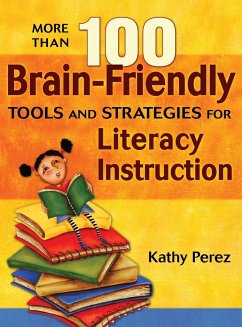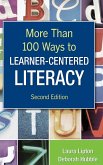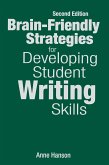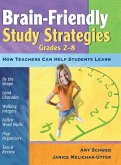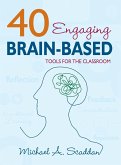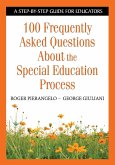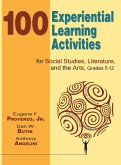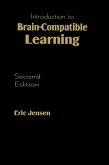Kathy Perez
More Than 100 Brain-Friendly Tools and Strategies for Literacy Instruction
Kathy Perez
More Than 100 Brain-Friendly Tools and Strategies for Literacy Instruction
- Gebundenes Buch
- Merkliste
- Auf die Merkliste
- Bewerten Bewerten
- Teilen
- Produkt teilen
- Produkterinnerung
- Produkterinnerung
These ready-to-use, brain-friendly strategies, standards-based activities, planning templates, and reproducibles help teachers boost literacy development and teach with the brain in mind.
Andere Kunden interessierten sich auch für
![More Than 100 Ways to Learner-Centered Literacy More Than 100 Ways to Learner-Centered Literacy]() Laura LiptonMore Than 100 Ways to Learner-Centered Literacy80,99 €
Laura LiptonMore Than 100 Ways to Learner-Centered Literacy80,99 €![Brain-Friendly Strategies for Developing Student Writing Skills Brain-Friendly Strategies for Developing Student Writing Skills]() Anne HansonBrain-Friendly Strategies for Developing Student Writing Skills87,99 €
Anne HansonBrain-Friendly Strategies for Developing Student Writing Skills87,99 €![Brain-Friendly Study Strategies, Grades 2-8 Brain-Friendly Study Strategies, Grades 2-8]() Amy SchwedBrain-Friendly Study Strategies, Grades 2-896,99 €
Amy SchwedBrain-Friendly Study Strategies, Grades 2-896,99 €![40 Engaging Brain-Based Tools for the Classroom 40 Engaging Brain-Based Tools for the Classroom]() Michael A. Scaddan40 Engaging Brain-Based Tools for the Classroom86,99 €
Michael A. Scaddan40 Engaging Brain-Based Tools for the Classroom86,99 €![100 Frequently Asked Questions about the Special Education Process 100 Frequently Asked Questions about the Special Education Process]() Roger Pierangelo100 Frequently Asked Questions about the Special Education Process33,99 €
Roger Pierangelo100 Frequently Asked Questions about the Special Education Process33,99 €![100 Experiential Learning Activities for Social Studies, Literature, and the Arts, Grades 5-12 100 Experiential Learning Activities for Social Studies, Literature, and the Arts, Grades 5-12]() Jr. Eugene F. Provenzo100 Experiential Learning Activities for Social Studies, Literature, and the Arts, Grades 5-1285,99 €
Jr. Eugene F. Provenzo100 Experiential Learning Activities for Social Studies, Literature, and the Arts, Grades 5-1285,99 €![Introduction to Brain-Compatible Learning Introduction to Brain-Compatible Learning]() Eric JensenIntroduction to Brain-Compatible Learning75,99 €
Eric JensenIntroduction to Brain-Compatible Learning75,99 €-
-
-
These ready-to-use, brain-friendly strategies, standards-based activities, planning templates, and reproducibles help teachers boost literacy development and teach with the brain in mind.
Hinweis: Dieser Artikel kann nur an eine deutsche Lieferadresse ausgeliefert werden.
Hinweis: Dieser Artikel kann nur an eine deutsche Lieferadresse ausgeliefert werden.
Produktdetails
- Produktdetails
- Verlag: Corwin
- Seitenzahl: 138
- Erscheinungstermin: 29. April 2008
- Englisch
- Abmessung: 286mm x 221mm x 12mm
- Gewicht: 626g
- ISBN-13: 9781412926928
- ISBN-10: 1412926920
- Artikelnr.: 23837957
- Herstellerkennzeichnung
- Libri GmbH
- Europaallee 1
- 36244 Bad Hersfeld
- gpsr@libri.de
- Verlag: Corwin
- Seitenzahl: 138
- Erscheinungstermin: 29. April 2008
- Englisch
- Abmessung: 286mm x 221mm x 12mm
- Gewicht: 626g
- ISBN-13: 9781412926928
- ISBN-10: 1412926920
- Artikelnr.: 23837957
- Herstellerkennzeichnung
- Libri GmbH
- Europaallee 1
- 36244 Bad Hersfeld
- gpsr@libri.de
Katherine Perez, a professor of education at Saint Mary's College of California, has over three decades of teaching experience from the preschool level through graduate school. A frequent presenter and enthusiastic "teacher cheerleader," she offers guidance to both novice and experienced educators. Perez is an international educational consultant, author, and motivational speaker, specializing in instructional strategies and creative approaches to literacy and professional development. She integrates state-of-the-art methods and research with passion and practical insights from her own classroom experiences. Perez has taught in many diverse environments, including in Richmond and Oakland, as a general educator, special educator, reading specialist, and curriculum and staff development coordinator. In order to "keep it real," she balances her college courses and her work as a coordinator for the California Beginning Teacher Support and Assessment program by serving as a literacy coach in a San Francisco Bay Area middle school, engaging even the most reluctant learners with brain-friendly techniques. Perez works with teachers, administrators and parents throughout the United States, Canada, Europe, the Caribbean, New Zealand, and Australia. For the past three years, she has conducted extensive training in Singapore and Hong Kong for the Ministry of Education.
Preface
About the Author
1. Brain-Based Literacy Learning - Pieces of the Puzzle
The Research Connection
Reading Comprehension and the Brain
Personal Connections
Reflect to Connect
Slow Down to Go Faster
Different Ways of Knowing - Different Ways of Showing
2. Activate to Educate!
Why Activate?
Prereading Strategies
Anticipation Guide/Prediction Guide
People Bingo
Windowpane
Graphic Organizers
K-W-L
Preview Puzzles
Sticky-Note Discussion/Graffiti Board
Story Impressions
Word Splash
Backtrack
Learning Lineup
Voting With Your Feet
Preview Pairs
Sort and Report
Postcard Connections
3. What Does a Brain-Compatible Classroom Look Like?
Tips for Developing a Brain-Compatible Classroom
Content and Process ("Gum" and "Chew")
State Changes
Management Tips
Grouping and Floor Plans
Learning Centers
Sample Centers
Creating Independent Learners
Strategies for Flexible Grouping
Managing for Grouping Accountability
Planning for Grouping
Mix-Mingle-Swap
Carousel Cruising
Walk and Talk Tour
Newscast Reporting
Clock Buddies
Grouping "Roundup"
4. Literacy is NOT a Spectator Sport!
Note Taking/ Note Making
Summary Strategies
Picture This: Stretch to Sketch
Rhyme Time
Slogans
Comparison
Questioning Strategies
Translation
Alliteration
Speculation
Applications
Reflection
5. Differentiate to Motivate!
Essential Elements of Differentiation
What Is This Thing Called Differentiation?
Pieces of the Puzzle
Managing Your Differentiated Classroom
Ten Things to Try Next Week (To Encourage Independence and Differentiate
Instruction)
Lesson Planning for Action
Professor of the Week
"Professor for the Week"
Active Participation Strategies
Give One/ Get One
Save the Last Word for Me!
Cubing
6. Into, Through, and Beyond Boosters
Developing an Instructional Framework
"Into" Strategies
"Through" Strategies
Coding Strategy
"Beyond" Strategies
Flip Book
"Two Facts and a Fib"
Question Fan
Celebrate a Book
Fishbone Strategy
Question "Connections"
Conclusion
References
Index
About the Author
1. Brain-Based Literacy Learning - Pieces of the Puzzle
The Research Connection
Reading Comprehension and the Brain
Personal Connections
Reflect to Connect
Slow Down to Go Faster
Different Ways of Knowing - Different Ways of Showing
2. Activate to Educate!
Why Activate?
Prereading Strategies
Anticipation Guide/Prediction Guide
People Bingo
Windowpane
Graphic Organizers
K-W-L
Preview Puzzles
Sticky-Note Discussion/Graffiti Board
Story Impressions
Word Splash
Backtrack
Learning Lineup
Voting With Your Feet
Preview Pairs
Sort and Report
Postcard Connections
3. What Does a Brain-Compatible Classroom Look Like?
Tips for Developing a Brain-Compatible Classroom
Content and Process ("Gum" and "Chew")
State Changes
Management Tips
Grouping and Floor Plans
Learning Centers
Sample Centers
Creating Independent Learners
Strategies for Flexible Grouping
Managing for Grouping Accountability
Planning for Grouping
Mix-Mingle-Swap
Carousel Cruising
Walk and Talk Tour
Newscast Reporting
Clock Buddies
Grouping "Roundup"
4. Literacy is NOT a Spectator Sport!
Note Taking/ Note Making
Summary Strategies
Picture This: Stretch to Sketch
Rhyme Time
Slogans
Comparison
Questioning Strategies
Translation
Alliteration
Speculation
Applications
Reflection
5. Differentiate to Motivate!
Essential Elements of Differentiation
What Is This Thing Called Differentiation?
Pieces of the Puzzle
Managing Your Differentiated Classroom
Ten Things to Try Next Week (To Encourage Independence and Differentiate
Instruction)
Lesson Planning for Action
Professor of the Week
"Professor for the Week"
Active Participation Strategies
Give One/ Get One
Save the Last Word for Me!
Cubing
6. Into, Through, and Beyond Boosters
Developing an Instructional Framework
"Into" Strategies
"Through" Strategies
Coding Strategy
"Beyond" Strategies
Flip Book
"Two Facts and a Fib"
Question Fan
Celebrate a Book
Fishbone Strategy
Question "Connections"
Conclusion
References
Index
Preface
About the Author
1. Brain-Based Literacy Learning - Pieces of the Puzzle
The Research Connection
Reading Comprehension and the Brain
Personal Connections
Reflect to Connect
Slow Down to Go Faster
Different Ways of Knowing - Different Ways of Showing
2. Activate to Educate!
Why Activate?
Prereading Strategies
Anticipation Guide/Prediction Guide
People Bingo
Windowpane
Graphic Organizers
K-W-L
Preview Puzzles
Sticky-Note Discussion/Graffiti Board
Story Impressions
Word Splash
Backtrack
Learning Lineup
Voting With Your Feet
Preview Pairs
Sort and Report
Postcard Connections
3. What Does a Brain-Compatible Classroom Look Like?
Tips for Developing a Brain-Compatible Classroom
Content and Process ("Gum" and "Chew")
State Changes
Management Tips
Grouping and Floor Plans
Learning Centers
Sample Centers
Creating Independent Learners
Strategies for Flexible Grouping
Managing for Grouping Accountability
Planning for Grouping
Mix-Mingle-Swap
Carousel Cruising
Walk and Talk Tour
Newscast Reporting
Clock Buddies
Grouping "Roundup"
4. Literacy is NOT a Spectator Sport!
Note Taking/ Note Making
Summary Strategies
Picture This: Stretch to Sketch
Rhyme Time
Slogans
Comparison
Questioning Strategies
Translation
Alliteration
Speculation
Applications
Reflection
5. Differentiate to Motivate!
Essential Elements of Differentiation
What Is This Thing Called Differentiation?
Pieces of the Puzzle
Managing Your Differentiated Classroom
Ten Things to Try Next Week (To Encourage Independence and Differentiate
Instruction)
Lesson Planning for Action
Professor of the Week
"Professor for the Week"
Active Participation Strategies
Give One/ Get One
Save the Last Word for Me!
Cubing
6. Into, Through, and Beyond Boosters
Developing an Instructional Framework
"Into" Strategies
"Through" Strategies
Coding Strategy
"Beyond" Strategies
Flip Book
"Two Facts and a Fib"
Question Fan
Celebrate a Book
Fishbone Strategy
Question "Connections"
Conclusion
References
Index
About the Author
1. Brain-Based Literacy Learning - Pieces of the Puzzle
The Research Connection
Reading Comprehension and the Brain
Personal Connections
Reflect to Connect
Slow Down to Go Faster
Different Ways of Knowing - Different Ways of Showing
2. Activate to Educate!
Why Activate?
Prereading Strategies
Anticipation Guide/Prediction Guide
People Bingo
Windowpane
Graphic Organizers
K-W-L
Preview Puzzles
Sticky-Note Discussion/Graffiti Board
Story Impressions
Word Splash
Backtrack
Learning Lineup
Voting With Your Feet
Preview Pairs
Sort and Report
Postcard Connections
3. What Does a Brain-Compatible Classroom Look Like?
Tips for Developing a Brain-Compatible Classroom
Content and Process ("Gum" and "Chew")
State Changes
Management Tips
Grouping and Floor Plans
Learning Centers
Sample Centers
Creating Independent Learners
Strategies for Flexible Grouping
Managing for Grouping Accountability
Planning for Grouping
Mix-Mingle-Swap
Carousel Cruising
Walk and Talk Tour
Newscast Reporting
Clock Buddies
Grouping "Roundup"
4. Literacy is NOT a Spectator Sport!
Note Taking/ Note Making
Summary Strategies
Picture This: Stretch to Sketch
Rhyme Time
Slogans
Comparison
Questioning Strategies
Translation
Alliteration
Speculation
Applications
Reflection
5. Differentiate to Motivate!
Essential Elements of Differentiation
What Is This Thing Called Differentiation?
Pieces of the Puzzle
Managing Your Differentiated Classroom
Ten Things to Try Next Week (To Encourage Independence and Differentiate
Instruction)
Lesson Planning for Action
Professor of the Week
"Professor for the Week"
Active Participation Strategies
Give One/ Get One
Save the Last Word for Me!
Cubing
6. Into, Through, and Beyond Boosters
Developing an Instructional Framework
"Into" Strategies
"Through" Strategies
Coding Strategy
"Beyond" Strategies
Flip Book
"Two Facts and a Fib"
Question Fan
Celebrate a Book
Fishbone Strategy
Question "Connections"
Conclusion
References
Index

